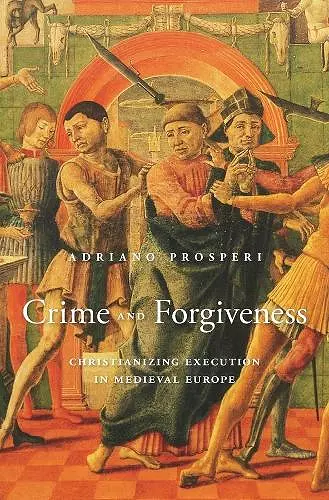Crime and Forgiveness
Christianizing Execution in Medieval Europe
Adriano Prosperi author Jeremy Carden translator
Format:Hardback
Publisher:Harvard University Press
Published:31st Jul '20
Should be back in stock very soon

A provocative analysis of how Christianity helped legitimize the death penalty in early modern Europe, then throughout the Christian world, by turning execution into a great cathartic public ritual and the condemned into a Christ-like figure who accepts death to save humanity.
The public execution of criminals has been a common practice ever since ancient times. In this wide-ranging investigation of the death penalty in Europe from the fourteenth to the eighteenth century, noted Italian historian Adriano Prosperi identifies a crucial period when legal concepts of vengeance and justice merged with Christian beliefs in repentance and forgiveness.
Crime and Forgiveness begins with late antiquity but comes into sharp focus in fourteenth-century Italy, with the work of the Confraternities of Mercy, which offered Christian comfort to the condemned and were for centuries responsible for burying the dead. Under the brotherhoods’ influence, the ritual of public execution became Christianized, and the doomed person became a symbol of the fallen human condition. Because the time of death was known, this “ideal” sinner could be comforted and prepared for the next life through confession and repentance. In return, the community bearing witness to the execution offered forgiveness and a Christian burial. No longer facing eternal condemnation, the criminal in turn publicly forgave the executioner, and the death provided a moral lesson to the community.
Over time, as the practice of Christian comfort spread across Europe, it offered political authorities an opportunity to legitimize the death penalty and encode into law the right to kill and exact vengeance. But the contradictions created by Christianity’s central role in executions did not dissipate, and squaring the emotions and values surrounding state-sanctioned executions was not simple, then or now.
Thoroughly chilling…[A] grimly fascinating story of public execution, viewed not as punishment for the body but as medicine for the soul…As a collection of stories assembled from archives little-known outside Italy, this is an invaluable exploration of the macabre. As a prompt to consider the relationship between mercy and truth, righteousness and peace, it raises questions of far wider significance. -- Nicholas Vincent * The Tablet *
From a distinguished Italian historian of early modern Europe comes a profound yet subtle work, written with great passion. Prosperi explores the comparative dimensions of Christianity’s relationships with public execution and its legitimization, principally in France, Germany, the Iberian peninsula, and England, with a particular focus on the religious confraternities devoted to consoling those condemned to be executed. -- Samuel K. Cohn, Jr., University of Glasgow
A valuable work, made accessible for the first time to English-speaking audiences. Prosperi’s analysis of how Christianity allows for the perpetuation and promotion of the death penalty by aligning it with divine justice and the need to heal the population injured by the crime, while simultaneously insisting that only God can take vengeance, provides a critical lens through which modern practice can, and should, be viewed. -- Larissa Tracy * Journal of the Church and State *
ISBN: 9780674659841
Dimensions: unknown
Weight: unknown
640 pages